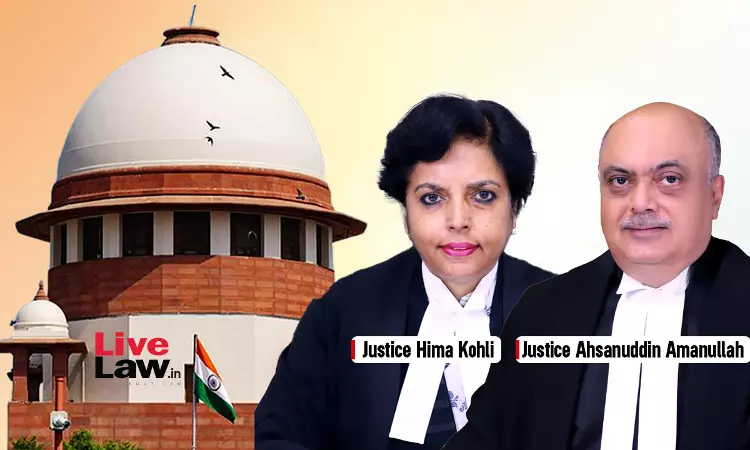- Home
- /
- Top Stories
- /
- Supreme Court Issues Directions...
Supreme Court Issues Directions Against Misleading Ads: Self Declaration Forms By Advertisers; Endorsers Liable
Gyanvi Khanna
7 May 2024 2:50 PM GMT
The Supreme Court, in a pivotal order today (May 07), passed a slew of measures to protect consumers from misleading advertisements. The directions included equal responsibility of advertisers and endorsers qua misleading ads and the uploading of a self-declaration form by advertisers before issuing any advertisements. Regarding the first direction, the Court noted that the endorsements...
The Supreme Court, in a pivotal order today (May 07), passed a slew of measures to protect consumers from misleading advertisements. The directions included equal responsibility of advertisers and endorsers qua misleading ads and the uploading of a self-declaration form by advertisers before issuing any advertisements.
Regarding the first direction, the Court noted that the endorsements by public figures, influencers, celebrities etc. go a long way in promoting a product. In this backdrop, the Court stated that it is imperative for them to act with responsibility when endorsing any product in the course of advertisements and taking responsibility.
The Court drew its strength from the Central Consumer Protection Authority (CCPA) guidelines, which specifically define bait advertisements, endorsers, and surrogate advertisements. The Court also referred to guideline 13, which requires due diligence for advertisement endorsement.
Regarding the second direction, the Court ordered “As a tide over measure, it is deemed appropriate to direct that, before a advertisement is permitted, a self-declaration be obtained from the advertiser in the light of Cable Television Network Rules, 1994.”
As per the order, this self-declaration is required to be uploaded on the Broadcast Seva Portal, run under the aegis of Ministry of Information and Broadcasting. The advertisement shall run on the relevant channels only thereafter.
Lastly, the Court, for the press/ print media, directed the Ministry to create a separate portal for uploading the self-declaration within four weeks. “Immediately after the portal is activated, all ads in press/ print media, the advertisers shall file the self-declaration before issuing any advertisements in the print media,” the order added.
The court also marked that the self-declaration forms shall be made available by the advertiser to the concerned broadcaster for the records.
The bench of Justices Hima Kohli and Ahsanuddin Amanullah passed this order while hearing the contempt case against Patanjali over the publication of misleading advertisements.
To recap, the matter was listed today for consideration of the larger issue of misleading health claims made by Fast-Moving Consumer Goods (FMCGs)/drugs companies through ads, as well as the Union's decision to omit Rule 170 from the 1945 Rules.
During the hearing, the Court deliberated if the complaints received under the Grievances Against Misleading Advertisements (GAMA) portal were acted upon and if the CCPA guidelines are being adhered to.
Amidst these observations, the Court highlighted the plight of the consumer. The Court firmly stated that the Consumer cannot be asked to run from pillar to post.
“It is said that the consumer is a king. There has to be some answerability from some agency. we are looking this from the point of consumer. Consumer should have a remedy. If there is a system in place, that should work.”
In view of this, the Court also recorded, in its order, that the Central Consumer Protection Authority (CCPA) provisions under the Consumer Protection Act should be used “vigorously.”
“While the Consumer protection Act has incorporated an entire chapter on Central Consumer Protection Authority which contemplates that the central government should establish CCPA to regulate the matters relating to the violation of the rights of the consumers, untrade practices and false/ misleading advertisements which are prejudicial to the interest of public and consumer and to protect, promise and enforce the rights of consumer as a class, provisions ought to be put to use vigorously.”
Regarding this, the Court also recorded the ASG's submission that the Centre has established the CCPA and its functions.
The Court highlighted that these provisions and guidelines are ultimately meant to serve the consumer and ensure that the Consumer is aware of the kind of product that is being purchased from the market, particularly in the health and food sector.
Notably, the Court also underscored the need for the Ministries to set up a specific procedure that will encourage the consumer to lodge a complaint. This was proposed so that the complaint could be taken to a logical conclusion instead of simply being marked to the concerned State authority.
Case Title: Indian Medical Association v. Union of India | W.P.(C) No. 645/2022
Also from the hearing: Facing Supreme Court's Wrath, Centre Undertakes To 'Forthwith' Withdraw Letter Asking States To Not Act Against Ayurvedic Drugs Ads
Supreme Court Expresses Displeasure At Continuation Of Patanjali's Ads For Suspended Products
Citation : 2024 LiveLaw (SC) 381


